Is TCM Effective and Safe? Everything You Need to Know Before You Buy
Posted by Diana Moll, L. Ac. on Jan 01, 2025
There are so many options available for healthcare and improving your overall well-being that it can become overwhelming. In your search for natural wellness, one option you should consider is Traditional Chinese medicine (TCM) because of its focus on prevention and holistic healing. But like any new path to wellness, questions arise: Is TCM effective and safe? And how does it fit into a modern lifestyle? These are valid concerns, and understanding TCM’s rich history, core principles, and the science behind its practices is key to making an informed decision.
What is Traditional Chinese Medicine (TCM)?
Traditional Chinese Medicine (TCM) offers a profound, centuries-old approach to health rooted in balance, harmony, and the interconnectedness of body and mind. It is an ancient Chinese therapy and comprehensive healthcare system practiced for over 2,000 years. Unlike Western medicine, which often focuses on diagnosing and treating specific diseases, TCM emphasizes holistic healing and a preventative approach. Its primary goal is maintaining balance and harmony within the body, mind, and spirit.
Core Principles of TCM
At the heart of TCM lies the philosophy of yin and yang, the opposing yet complementary forces in all aspects of life. Yin represents cooling, nurturing energy, while yang embodies warming, activating energy. Health, in TCM, is achieved when these forces are balanced. Disrupted equilibrium can lead to physical and emotional ailments through diet, stress, or environmental changes.
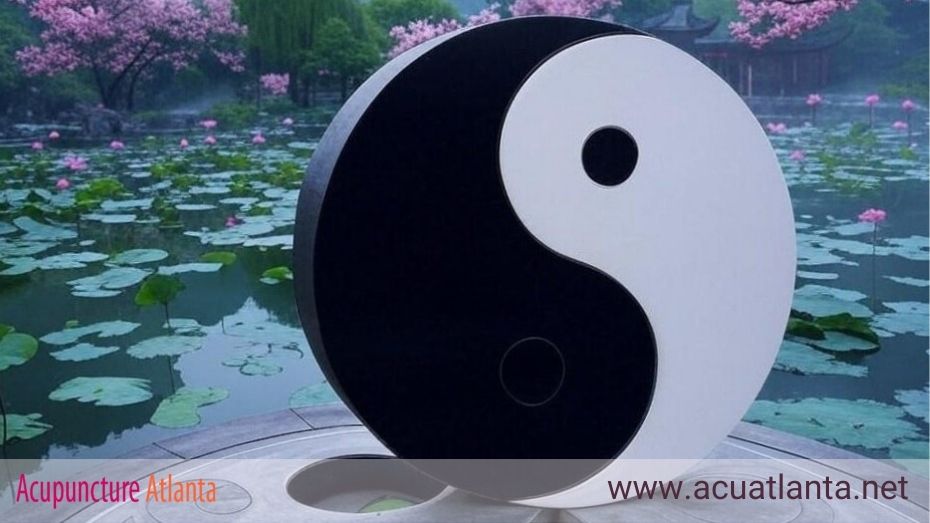
Another cornerstone of Chinese holistic medicine is the flow of Qi (pronounced “chee”), the vital energy circulating throughout the body via pathways called meridians. These meridians link organs and systems, ensuring the body functions as a cohesive unit. When Qi becomes stagnant or blocked, it disrupts this interconnected system, leading to conditions ranging from digestive issues to fatigue or anxiety. For more information, see our previous blog post on Qi energy flow and balance in everyday life.
The Five Elements
The Five Elements theory, a fundamental concept in TCM, provides a framework for understanding the relationship between the body, emotions, and the environment. These elements—Wood, Fire, Earth, Metal, and Water—are thought to correspond to specific organs, seasons, and emotional states. For example:
- Wood is linked to the liver, springtime, and emotions like anger.
- Fire relates to the heart, summer, and joy.
- Earth governs the spleen, late summer, and worry.
- Metal corresponds to the lungs, autumn, and grief.
- Water connects to the kidneys, winter, and fear.
Practitioners of Chinese traditional medicine use these elements to diagnose and address imbalances, creating tailored treatment plans that promote harmony and wellness.
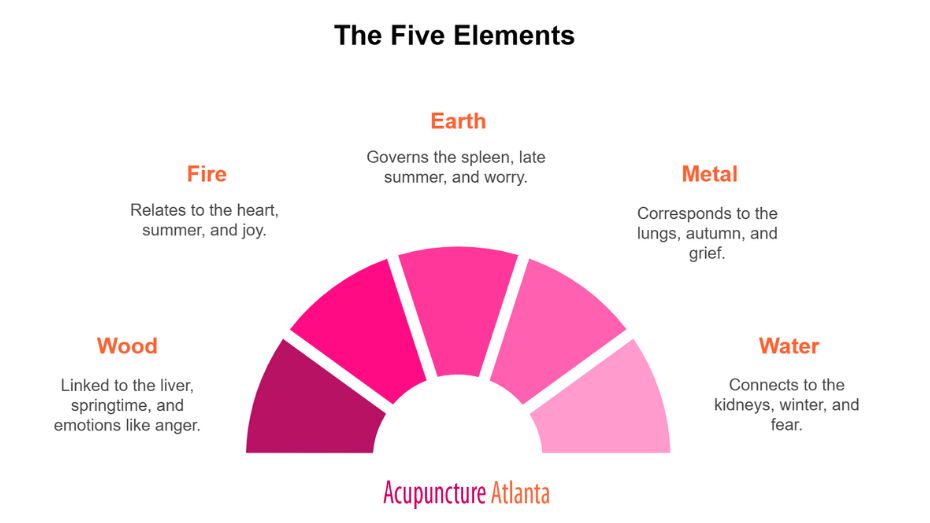
Key Practices in TCM
TCM encompasses a range of ancient Chinese medicine techniques designed to address imbalances and support the body’s natural healing processes. The most common Eastern medicine treatments include:
- Acupuncture: By inserting thin needles into specific meridian points, practitioners aim to unblock Qi, alleviate pain, and restore balance.
- Herbal Medicine: Often referred to as the backbone of TCM, Chinese herbal treatments use plant-based remedies like ginseng, licorice root, and astragalus to treat various conditions, from immune deficiencies to inflammation.
- Dietary Therapy: Food is considered medicine in TCM, and personalized meal plans are crafted based on an individual’s constitution and seasonal changes. For instance, warming foods like ginger may be recommended during winter months.
- Cupping Therapy: Suction cups stimulate circulation, relieve muscle tension, and promote overall energy flow.
- Moxibustion: Mugwort, a traditional Chinese herb, is burned near the skin or on acupuncture points to improve blood flow and strengthen Qi.
The History of TCM
TCM's roots stretch back to ancient China, with seminal texts like the Huangdi Neijing (Yellow Emperor’s Inner Classic), a cornerstone of ancient Chinese medicine, forming the basis of its philosophy and techniques. These works documented insights into Qi, yin and yang, and the Five Elements, laying the groundwork for Chinese traditional medicine as we know it today.
Over centuries, TCM evolved through empirical practices, blending with cultural and philosophical developments. This adaptability has allowed TCM to remain a cornerstone of healthcare in Asia while gaining recognition worldwide as a legitimate alternative or complement to Western practices.
A Timeless Practice in Modern Times
Despite its ancient origins, TCM remains highly relevant today. Today, TCM serves as a bridge between ancient wisdom and modern wellness. Chinese healing techniques are increasingly sought after to address health challenges like chronic pain, insomnia, and stress. Many people turn to TCM as a gentler, preventative form of care, drawn to its focus on restoring harmony rather than merely suppressing symptoms. Relevant to this time of the year, see our previous blog post on reducing holiday stress with TCM.
Furthermore, the integration of TCM into contemporary wellness routines is expanding globally. Practices like acupuncture and herbal medicine are widely recognized for their efficacy and are often used alongside Western treatments for enhanced outcomes.
How TCM Stacks Up Against Western Medicine
Holistic vs. Targeted Approaches
Western medicine, often referred to as modern or allopathic medicine, excels in diagnosing and addressing acute conditions through advanced diagnostics, pharmaceuticals, and surgical interventions. It takes a targeted approach, focusing on treating specific symptoms or diseases. While this method is highly effective for emergencies and severe illnesses, it may not always address the underlying causes of chronic conditions or long-term health issues.
In contrast, Traditional Chinese Medicine (TCM) offers a holistic approach, rooted in ancient Eastern medicine techniques that aim to harmonize the entire body. By focusing on balance, prevention, and the body’s interconnected systems, TCM seeks to address the root causes of ailments rather than merely alleviating symptoms. This philosophy extends to emotional and environmental factors often considered integral to overall health.
For instance, TCM practitioners may view recurring migraines not just as a neurological issue but as a sign of Qi stagnation, emotional stress, or dietary imbalances, addressing these aspects collectively.
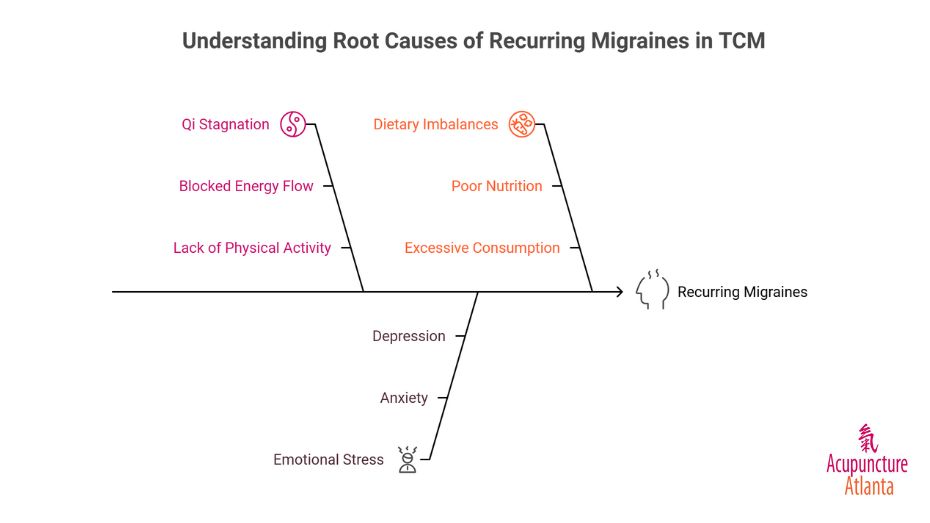
Integration for Better Outcomes
The synergy between TCM and Western medicine highlights the strengths of each system. In many cases, combining these approaches can yield superior outcomes, offering patients the best of both worlds. This integration is increasingly recognized in healthcare settings, where practitioners incorporate Chinese therapies such as acupuncture, herbal remedies, and dietary adjustments alongside conventional treatments.
- Acupuncture, a hallmark of TCM, is frequently used to manage pain, reduce stress, and promote recovery. For example, it can complement physiotherapy by improving circulation and alleviating inflammation.
- Herbal remedies, such as valerian root or ginseng, may provide natural support for insomnia or menopause symptoms without the side effects often associated with pharmaceuticals. For more information on insomnia, see our article on Chinese herbs for sleep.
- Eastern medicine techniques, like cupping or moxibustion, are now popular among athletes for muscle recovery and improved circulation, often used in conjunction with physical therapy.
This collaborative approach empowers individuals to benefit from Western medicine’s precision and TCM’s preventative, restorative focus. Whether navigating a chronic condition, recovering from surgery, or simply striving for better overall wellness, an integrative strategy can help achieve balance and vitality.
By understanding the unique strengths of TCM and Western medicine, you can make informed decisions about your healthcare, embracing a comprehensive approach that aligns with your needs and goals.
Is TCM Effective?
Scientific Studies
Traditional Chinese Medicine (TCM), deeply rooted in ancient Chinese medicine, continues to gain recognition for its efficacy, supported by a growing body of research. While certain practices require further scientific exploration, many Chinese healing techniques have demonstrated measurable benefits:
- Acupuncture: Widely recognized as a cornerstone of Chinese therapy, acupuncture has been scientifically validated for its role in pain management, stress relief, and hormone regulation. Studies have shown its effectiveness for conditions like migraines, osteoarthritis, and fertility support by improving blood flow and reducing inflammation. For further information, see our article on how acupuncture and TCM can help regulate menstruation and boost fertility.
- Herbal Medicine: Ingredients used in ancient Eastern medicine, such as ginseng, licorice root, and turmeric, have been extensively studied. These Chinese remedies potentially enhance immunity, improve digestion, and reduce inflammation. For example, turmeric’s anti-inflammatory properties are comparable to some pharmaceutical treatments. For more information, see our previous blog on Chinese herbs for boosting the immune system.
- Cupping Therapy: Often associated with Asian remedies, this technique has shown promise in improving circulation and aiding muscle recovery, particularly for athletes. Research suggests it helps relieve tension and promotes healing by stimulating local blood flow.

Balancing Evidence and Experience
As the global popularity of Chinese traditional medicine continues to grow, the interplay of scientific research and real-world testimonials provides a compelling case for its effectiveness. While some examples of Eastern medicine await further study, practices like acupuncture and Chinese herbal medicine already hold a firm place in integrative healthcare.
Whether you're exploring TCM for chronic pain, stress relief, or digestive health, the combination of research-backed techniques and time-tested traditions offers a credible and holistic path to wellness.
Common Myths and Misconceptions About TCM
As Traditional Chinese Medicine (TCM) gains global popularity, misconceptions about its practices and effectiveness persist. Let’s address some of the most common myths and separate fact from fiction.
1. "It’s not scientific."
One of the most widespread beliefs about Chinese traditional medicine is that it lacks scientific backing. While TCM originated outside the Western scientific framework, a growing body of research supports many of its practices. Techniques like acupuncture and herbal medicine have been studied extensively, with evidence demonstrating their efficacy for conditions like chronic pain, stress, and inflammation. For example, acupuncture is endorsed by the World Health Organization (WHO) for managing various health concerns. Modern studies continue to explore and validate TCM’s impact, making it a credible component of integrative healthcare.
2. "Herbs are unsafe."
Concerns about the safety of Chinese herbal medicine often stem from misinformation or poor-quality products. However, when sourced from reputable vendors and used under the guidance of a qualified practitioner, Chinese remedies are safe and effective. High-quality, GMP-certified herbal products undergo rigorous testing to ensure they are free from contaminants or harmful additives. For instance, herbs like ginseng, goji berries, and turmeric are widely recognized for their health benefits and are staples of Chinese vitamins and supplements. Always choose trusted sources, such as AcuAtlanta, to ensure the safety and efficacy of Chinese medicine treatment options.
3. "It replaces Western medicine."
A common myth is that TCM seeks to replace Western medicine, but this is far from the truth. TCM is best used as a complement to—not a substitute for—conventional treatments. The holistic nature of TCM works well alongside Western approaches, addressing the root causes of health concerns, while Western medicine focuses on targeted symptom management. For instance, someone recovering from surgery might use acupuncture to reduce pain and stress or incorporate Chinese therapy practices like herbal teas to support digestion and immunity during recovery.
The synergy between Eastern medicine techniques and Western practices often leads to more comprehensive and effective healthcare outcomes. Dispelling these myths is essential for understanding the true value of ancient Chinese medicine. With proper research, qualified practitioners, and high-quality products, TCM offers a safe, effective, and integrative approach to wellness for individuals of all ages.
Is TCM Safe?
Key Safety Considerations
The safety of Traditional Chinese Medicine (TCM) largely depends on the quality of care and products, as well as open communication between patients and practitioners. By following these essential guidelines, you can ensure a positive and secure experience with Chinese holistic medicine:
- Qualified Practitioners: Always seek out licensed and certified professionals. In the United States, look for practitioners accredited by recognized institutions like the National Certification Commission for Acupuncture and Oriental Medicine (NCCAOM). These experts are trained extensively in Chinese healing techniques and adhere to rigorous safety standards.
- Product Quality: High-quality Chinese herbal medicine is key to safe and effective treatments. Choose GMP-certified products (Good Manufacturing Practices) to ensure they meet strict safety, purity, and potency standards. Reputable vendors like AcuAtlanta provide rigorously vetted Chinese remedies, reducing contamination risks or adulteration.
- Consultation: Before starting any TCM treatments, disclose all current medications, allergies, and health conditions to both your TCM practitioner and conventional doctor. This ensures that herbal products or other Chinese medicine techniques complement your existing care plan without causing adverse interactions.
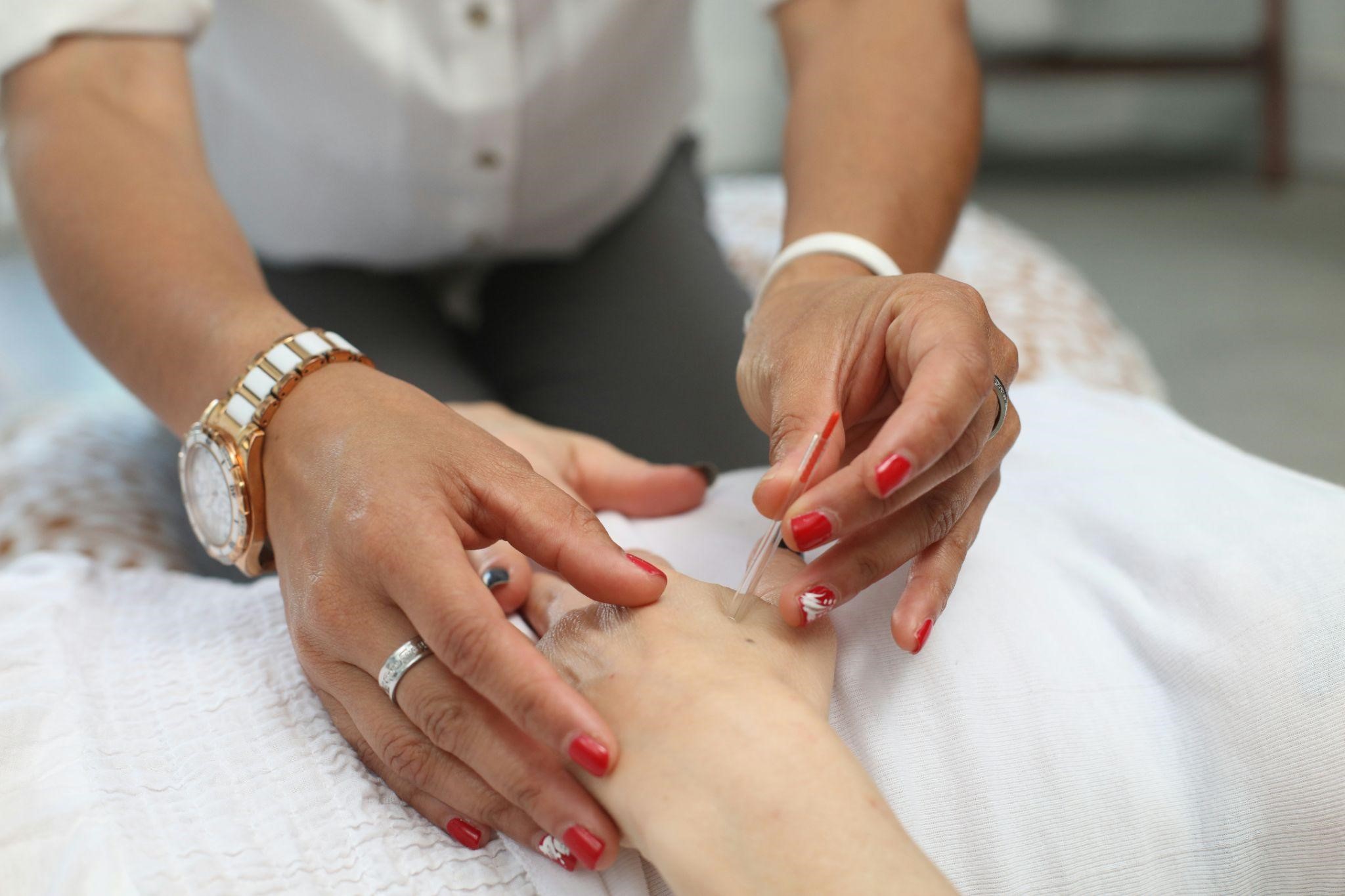
Acupuncture Safety
Acupuncture, a central component of Chinese therapy, is highly safe when performed by licensed practitioners. Using sterile, single-use needles minimizes the risk of infection, and adverse effects are rare. Minor side effects like mild bruising or soreness at the insertion points may occasionally occur but typically resolve quickly.The safety of acupuncture is recognized worldwide, making it one of the most trusted Chinese medicine treatment methods for pain relief, stress management, and overall wellness.
A Holistic, Safe Approach
By choosing qualified practitioners, prioritizing certified products, and maintaining open communication about your health, you can confidently explore ancient Chinese medicine as a safe and effective complement to your wellness journey.
How to Incorporate TCM Into Your Life
Adopting Traditional Chinese Medicine (TCM) into your routine doesn’t require a complete lifestyle overhaul. The flexibility of TCM allows for both small steps and long-term commitments, making it accessible for anyone interested in reaping its benefits. Here’s how you can start incorporating Chinese holistic health practices into your daily life.
Starting Small
If you’re new to TCM, begin with simple yet impactful practices to ease into its philosophy and techniques:
- Acupuncture for Stress Relief: Many first-time TCM users use acupuncture to manage stress, improve sleep, or alleviate tension. A few sessions can help restore balance and provide a sense of calm.
- Herbal Teas for Digestion: Try herbal teas like ginger or chamomile, which are staples of ancient Chinese medicine. These teas aid digestion, promote relaxation, and enhance overall well-being.
- Seasonal Food Principles: In TCM, food is considered medicine. Start by incorporating dietary therapy principles into your meals. For instance, include warming foods like root vegetables and spices in winter or lighter, cooling foods like cucumber and watermelon in summer. These small changes align with TCM’s focus on adapting to seasonal needs and improving Chinese wellness.
Long-Term Integration
Once you’ve explored some introductory practices, consider building a more comprehensive routine that reflects the preventative nature of Chinese holistic medicine:
- Combine TCM with Yoga or Mindfulness: Pairing TCM techniques, such as acupuncture or cupping, with mindfulness practices, meditation, or yoga can enhance your physical and mental balance. This combination aligns well with the interconnected philosophy of oriental medicine. For more information on this subject, see our previous blog post on meditating for physical and mental well-being.
- Use TCM Therapies Preventively: Unlike Western medicine, which often focuses on treating symptoms, Chinese traditional medicine emphasizes prevention. Regular acupuncture sessions, herbal supplements, and dietary adjustments can help maintain balance and vitality over time, reducing the risk of illnesses before they arise.
Integrating Chinese medicine TCM into your life, whether through small steps or a comprehensive wellness plan, offers a pathway to sustained health and harmony. By embracing these practices, you’re supporting your physical body and nurturing your mind and spirit—key principles of ancient Chinese therapy.
Choosing the Right TCM Products
Selecting the right products is crucial to ensuring the safety and effectiveness of your Traditional Chinese Medicine (TCM) journey. With countless options available, understanding what to look for can make all the difference. Here’s how to prioritize quality and trust when choosing Chinese holistic medicine products.
Certifications to Prioritize
- Good Manufacturing Practices (GMP): Always opt for GMP-certified products that meet rigorous safety, quality, and efficacy standards. This certification ensures that your Chinese medicine TCM products are free from contaminants and adhere to strict manufacturing protocols.
- Organic Labels: Products labeled organic offer an added layer of confidence in their sustainability, purity, and alignment with TCM’s holistic philosophy. These certifications guarantee that your herbs or supplements are grown without harmful chemicals, preserving their natural integrity.
- Third-Party Testing: Look for products that have undergone independent testing for potency and safety, further ensuring their reliability.
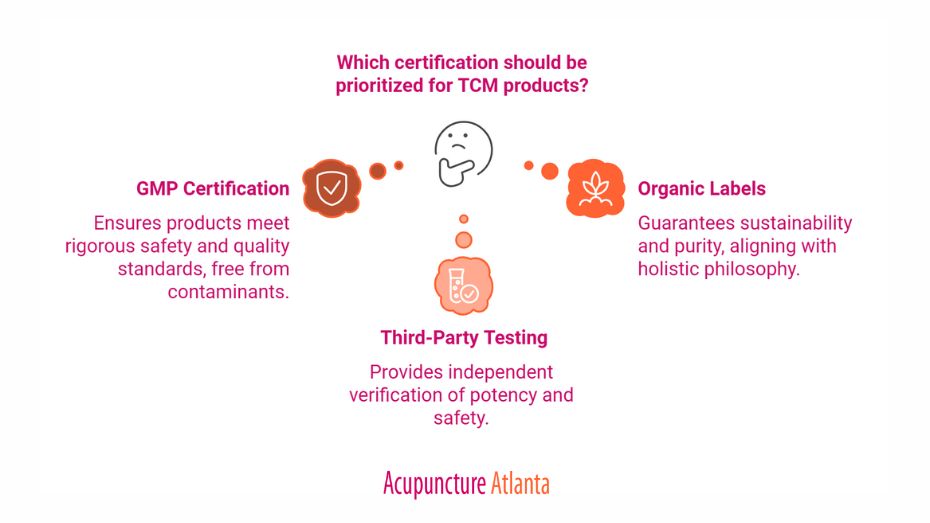
Trusted Source
Equally important as certifications is sourcing your Chinese remedies from a reputable vendor. AcuAtlanta offers a full range of TCM products that meet the highest quality standards. Always consult a qualified practitioner to guide your selection of Chinese vitamins, herbs, or other TCM products. This ensures they align with your unique health needs and support your path to balance and vitality. With the right products in hand, your journey into Chinese holistic health becomes not only effective but also safe and empowering.
Frequently Asked Questions
Can TCM Work for Chronic Conditions?
Yes, TCM is effective for managing chronic pain, stress, and digestive issues when used consistently.
Is TCM Suitable for Children?
Yes, but consult a pediatric TCM specialist for safe, tailored treatments.
How Long Before I See Results?
Acupuncture may provide immediate relief, while herbal remedies often take a few weeks.
Is TCM Effective and Legitimate?
Yes, it is recognized globally and increasingly validated by scientific research.











